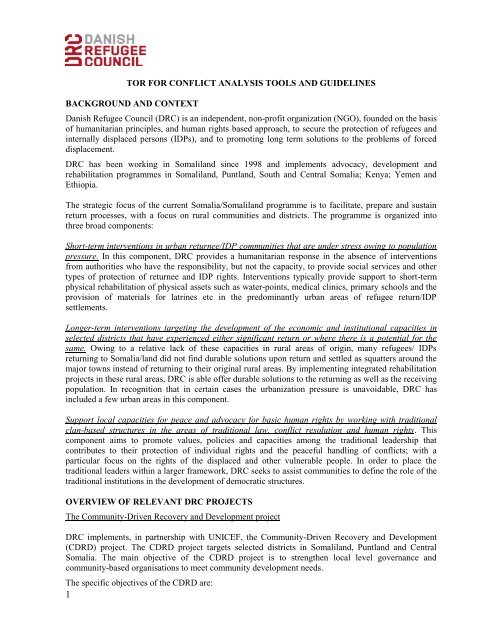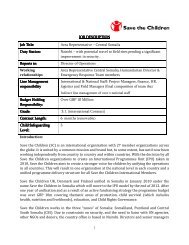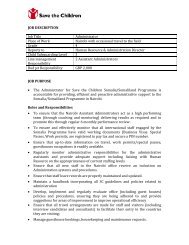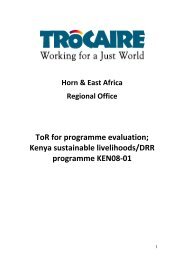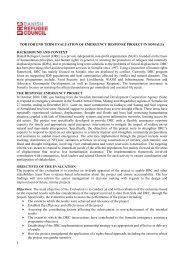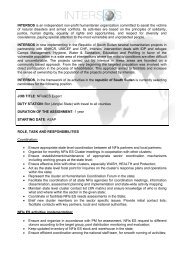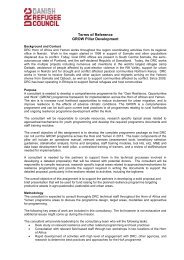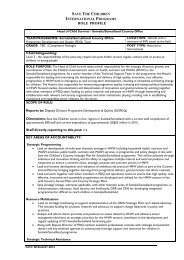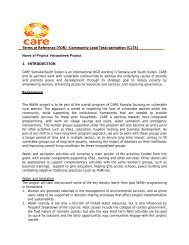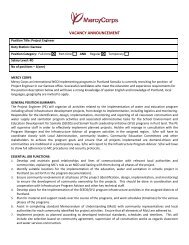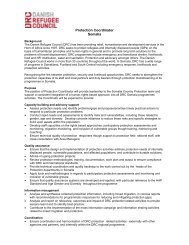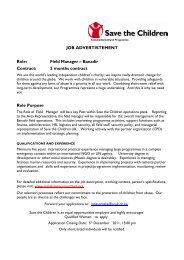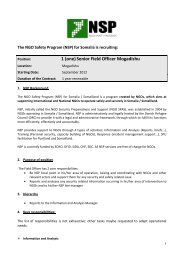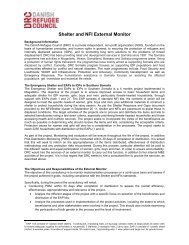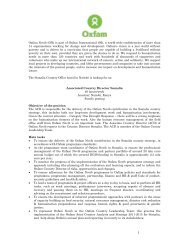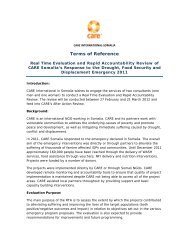TOR FOR CONFLICT ANALYSIS TOOLS AND GUIDELINES ...
TOR FOR CONFLICT ANALYSIS TOOLS AND GUIDELINES ...
TOR FOR CONFLICT ANALYSIS TOOLS AND GUIDELINES ...
You also want an ePaper? Increase the reach of your titles
YUMPU automatically turns print PDFs into web optimized ePapers that Google loves.
<strong>TOR</strong> <strong>FOR</strong> <strong>CONFLICT</strong> <strong>ANALYSIS</strong> <strong>TOOLS</strong> <strong>AND</strong> <strong>GUIDELINES</strong><br />
BACKGROUND <strong>AND</strong> CONTEXT<br />
Danish Refugee Council (DRC) is an independent, non-profit organization (NGO), founded on the basis<br />
of humanitarian principles, and human rights based approach, to secure the protection of refugees and<br />
internally displaced persons (IDPs), and to promoting long term solutions to the problems of forced<br />
displacement.<br />
DRC has been working in Somaliland since 1998 and implements advocacy, development and<br />
rehabilitation programmes in Somaliland, Puntland, South and Central Somalia; Kenya; Yemen and<br />
Ethiopia.<br />
The strategic focus of the current Somalia/Somaliland programme is to facilitate, prepare and sustain<br />
return processes, with a focus on rural communities and districts. The programme is organized into<br />
three broad components:<br />
Short-term interventions in urban returnee/IDP communities that are under stress owing to population<br />
pressure. In this component, DRC provides a humanitarian response in the absence of interventions<br />
from authorities who have the responsibility, but not the capacity, to provide social services and other<br />
types of protection of returnee and IDP rights. Interventions typically provide support to short-term<br />
physical rehabilitation of physical assets such as water-points, medical clinics, primary schools and the<br />
provision of materials for latrines etc in the predominantly urban areas of refugee return/IDP<br />
settlements.<br />
Longer-term interventions targeting the development of the economic and institutional capacities in<br />
selected districts that have experienced either significant return or where there is a potential for the<br />
same. Owing to a relative lack of these capacities in rural areas of origin, many refugees/ IDPs<br />
returning to Somalia/land did not find durable solutions upon return and settled as squatters around the<br />
major towns instead of returning to their original rural areas. By implementing integrated rehabilitation<br />
projects in these rural areas, DRC is able offer durable solutions to the returning as well as the receiving<br />
population. In recognition that in certain cases the urbanization pressure is unavoidable, DRC has<br />
included a few urban areas in this component.<br />
Support local capacities for peace and advocacy for basic human rights by working with traditional<br />
clan-based structures in the areas of traditional law, conflict resolution and human rights. This<br />
component aims to promote values, policies and capacities among the traditional leadership that<br />
contributes to their protection of individual rights and the peaceful handling of conflicts; with a<br />
particular focus on the rights of the displaced and other vulnerable people. In order to place the<br />
traditional leaders within a larger framework, DRC seeks to assist communities to define the role of the<br />
traditional institutions in the development of democratic structures.<br />
OVERVIEW OF RELEVANT DRC PROJECTS<br />
The Community-Driven Recovery and Development project<br />
DRC implements, in partnership with UNICEF, the Community-Driven Recovery and Development<br />
(CDRD) project. The CDRD project targets selected districts in Somaliland, Puntland and Central<br />
Somalia. The main objective of the CDRD project is to strengthen local level governance and<br />
community-based organisations to meet community development needs.<br />
The specific objectives of the CDRD are:<br />
1
a) To enable communities to freely exercise their right to decide on the design, implementation<br />
and evaluation of their own development programs (Community empowerment);<br />
b) To develop and to build the capacity of local government to be more responsive to<br />
community needs (Bottom-up governance);<br />
c) To enable the delivery of sustainable and inclusive services and infrastructures (Socio and<br />
economic services).<br />
The CDRD provides both demand- and supply-driven training and technical assistance to existing<br />
institutions at community level, such as the Village Committees (which are sub-committees of the<br />
District Council) and ad-hoc community-based groups, to mobilize communities, develop plans at<br />
community level (or inform the District Development Framework -when this is in place), draft subproject<br />
proposals and budgets, manage sub-projects, and maintain services and infrastructures created<br />
by the sub-projects;<br />
In addition, the CDRD provides (a) two rounds of untied Block Grants, each round averaging USD<br />
15,000 per community, to finance a sub-project proposal developed either out of the District<br />
Development Framework, or, alternatively, of the community plan (if the former is not in place), and<br />
(b) Social Services Access Grants (SAGs), a one-off conditional cash transfer scheme, provide a grant<br />
not exceeding USD 5,000 per community to financially support the poorest and most vulnerable<br />
members in the target communities in accessing certain social services.<br />
The DIALOGUE project<br />
DRC implements the Develop Informed and Accountable Local Governance through User<br />
Empowerment (DIALOGUE) project. The overall objective of the DIALOGUE project is to support the<br />
effective participation of non-government organizations at the local level in peace-building and good<br />
governance. Specific objectives of the action are to:<br />
a) Empower communities by enabling them to freely exercise their right to decide on the design,<br />
implementation and evaluation of their own development programs;<br />
b) Promote bottom-up governance development through dialogue amongst communities and with<br />
district authorities.<br />
The above specific objectives are in common with objectives a) and b) of the CDRD project. The<br />
DIALOGUE project intends to reinforce the impact of the CDRD approach and, in particular, to<br />
complement the participatory approach of the CDRD with additional activities that are aimed to support<br />
the state building process and the reconciliation process in the target districts.<br />
To achieve the above objectives, the DIALOGUE is expected to attain the following results:<br />
1) Community committees that have been previously supported by the CDRD are able to engage<br />
in a dialogue with their government interlocutors;<br />
2) Community committees that have been previously supported by the CDRD have the capacity to<br />
prevent and resolve local conflicts;<br />
3) Inter-community small-scale sub-projects are jointly implemented by groups of community<br />
committees through sub-grants;<br />
4) Local peace-building initiatives resulting in small-scale services and infrastructures aimed at<br />
resolving conflicts between, or within, communities, are identified and implemented.<br />
2
PURPOSE OF THE ASSIGNMENT<br />
The purpose of this assignment is to develop conflict analysis tools that can be used by DRC to attain<br />
Result 4 above.<br />
In addition to the DIALOGUE project, DRC will use the conflict analysis tools to ensure that its<br />
support is conflict sensitive and meet the do-no-harm principles. In the case of the CDRD, the tools will<br />
ensure that the capacity building support and the grants do not fuel conflict within the target<br />
communities and among neighboring communities.<br />
SCOPE OF THE CONSULTANCY<br />
To this end, DRC is seeking an external consultant to:<br />
3<br />
Develop guidelines and tools for making decisions regarding appropriate interventions<br />
undertaken by the DRC programme in Somalia/Somaliland.<br />
The consultant will target the work undertaken by the DRC community development teams for the<br />
CDRD project, and advocacy teams for the DIALOGUE project.<br />
The guidelines will be used by DRC staff to determine appropriate parameters for intervention in clanbased<br />
conflicts.<br />
TARGET AUDIENCE<br />
DRC senior management in Somaliland, Puntland and Galkayo<br />
Technical senior staff<br />
Advocacy field staff<br />
Community development workers<br />
METHODOLOGY<br />
It is anticipated that this consultancy will be conducted using the following approaches:<br />
Review of existing materials relevant to the DIALOGUE project;<br />
Review of the CDRD operations manual and its annexes and form;<br />
Review of existing household questionnaires<br />
Review of DRC’s past conflict resolution interventions;<br />
Consultations with DRC staff and other stakeholders in Nairobi and in various project locations<br />
in Somalia;<br />
Filed visits throughout Somaliland, Puntland and Galkayo.<br />
EXPECTED OUTPUTS<br />
The assignment will produce the following outputs:<br />
a) User friendly tools to be used by DRC staff in order to appraise potential conflicts in areas that<br />
are targeted by DRC support;<br />
b) A set of guidelines and procedures for DRC to determine which conflicts can be addressed<br />
under the DRC programme (in line with the CDRD operation manual and DIALOGUE project<br />
documents);<br />
c) A workshop where DRC staff and trainers will be trained on the tools and procedures.<br />
DURATION<br />
The assignment will take up to 30 days including preparation, meeting with DRC staff and other<br />
stakeholders in Nairobi and Somalia/Somaliland, field visits and report writing.
It is expected that the consultant will travel to Somalia for at least 50% of the duration of the<br />
assignment.<br />
DRC will not be responsible for any insurance and travel outside the designated project coverage.<br />
RESPONSIBILITIES OF DRC<br />
Provide transport to and from the field in line with existing DRC Security Procedures.<br />
Provide accommodation to consultant during the field visits<br />
Pay consultancy fees at a mutually agreed rate<br />
Provide a staff member that will accompany the Consultant throughout the field mission to<br />
interpret and facilitate as necessary.<br />
RESPONSIBILITIES OF CONSULTANT<br />
The consultant should provide a personal computer and will be expected to make a quality<br />
report.<br />
Actively engage with the group & community members and other stakeholders to generate<br />
adequate information to make informed decision.<br />
QUALIFICATIONS:<br />
The Consultant should have experience with traditional conflict resolution and/or peace<br />
building, preferably in a Somali context.<br />
Proven ability to design and actualize evaluation methodologies and to write clearly and<br />
concisely in English. Writing samples may be requested.<br />
Strong analytical / data analysis skills<br />
At least 5 years experience in human rights law, education or other closely related field.<br />
Bachelor’s degree in law, peace studies or governance or a related field<br />
Experience with the Somaliland / Puntland context is an asset<br />
Independent from parties involved.<br />
GENERAL REQUIREMENTS<br />
The consultancy team will be comprised of one person. The consultant will not be allowed to subcontract<br />
another person to undertake on his/her behalf without consent from DRC management, which<br />
must be in writing.<br />
COMMITMENTS<br />
DRC has a Humanitarian Accountability Framework, outlining its global accountability commitments.<br />
All staff are required to contribute to the achievement of this framework<br />
(http://www.drc.dk/HAF.4265.0.html)<br />
APPLICATION PROCESS<br />
Applicants should send a 1-page cover letter that clearly explains their motivation for applying, as well<br />
as why they are particularly suited to achieve the job responsibilities, together with their CV (not longer<br />
than 4 pages). Additionally, applicants must send a brief methodology paper and work plan with their<br />
application package to: drcjobs@drchoa.org. Please indicate “Conflict Analysis” as the subject<br />
heading.<br />
The deadline for applications is 1 December, 2011. Expected start date is 12 December, 2011<br />
4


